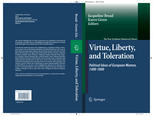

Most ebook files are in PDF format, so you can easily read them using various software such as Foxit Reader or directly on the Google Chrome browser.
Some ebook files are released by publishers in other formats such as .awz, .mobi, .epub, .fb2, etc. You may need to install specific software to read these formats on mobile/PC, such as Calibre.
Please read the tutorial at this link: https://ebookbell.com/faq
We offer FREE conversion to the popular formats you request; however, this may take some time. Therefore, right after payment, please email us, and we will try to provide the service as quickly as possible.
For some exceptional file formats or broken links (if any), please refrain from opening any disputes. Instead, email us first, and we will try to assist within a maximum of 6 hours.
EbookBell Team

4.1
50 reviewsThis volume challenges the view that women have not contributed to the historical development of political ideas, and highlights the depth and complexity of women’s political thought in the centuries prior to the French Revolution.
From the late medieval period to the enlightenment, a significant number of European women wrote works dealing with themes of political significance. The essays in this collection examine their writings with particular reference to the ideas of virtue, liberty, and toleration. The figures discussed include Christine de Pizan, Catherine d’Amboise, Isabella d’Este, Elizabeth I, Katherine Chidley, Elizabeth Poole, Margaret Cavendish, Damaris Masham, Mary Astell, Elizabeth Carter, Catharine Macaulay, Mary Wollstonecraft, and Cornélie Wouters. These women actively contributed to the political practice and discourse of their times. Some of the women question their exclusion from political power and argue in favour of women’s virtue, prudence, and capacity to govern. Others aim to demonstrate women’s spiritual equality with men, to defend liberty of conscience, and to highlight the importance of education as a means to moral development. And some women explore the notion of female citizenship or attempt to come to terms with issues of religious freedom and religious toleration.
Virtue, Liberty, and Toleration serves as an introduction to a rich and as yet under-explored period in the history of women’s ideas.